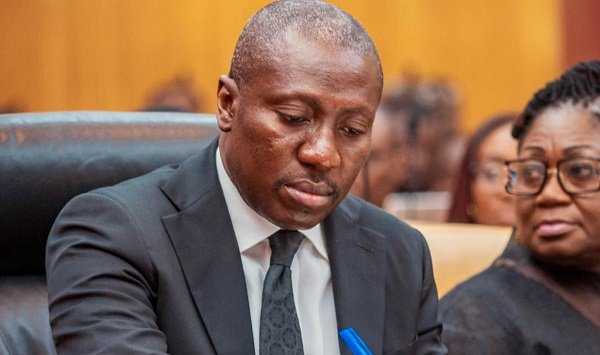Alexander Afenyo-Markin, the Minority Leader in Parliament, has said the former Akufo-Addo government lost the middle class through the haircut and difficult decisions they had to take to save the Ghanaian economy.
The minority leader admitted that, as a politician, one should not shy away from their weaknesses.
According to him, the NPP government had its successes and failures in government.
Speaking in an interview on JoyNews on October 27, 2025, Afenyo-Markin explained, “As a politician, you should not be shy about your weaknesses. When you come into government, you have your success story, you have your failings.
We are not here to talk about my weakness; we can talk about the weakness of the party. We had the opportunity, we were faced with some huge challenges, we were tired, but we were not too successful typical example is galamsey. It was a great concern”.
He added, “The global crisis that hit us, with COVID, and then eventually we had to stabilise the economy, in stabilising which meant that certain hard decisions had to be taken.
We lost the middle class, our own base, the businessmen, because there were some haircuts, pensioners, educated people who ordinarily will vote NPP got disappointed, to the extent that a former Chief Justice who was appointed by our own administration, who ordinarily will have her love for our party, was on the streets fighting for her pension.
It is understandable, so all these things more or less took away the shine”.
Meanwhile, former President Nana Addo Dankwa Akufo-Addo has admitted that Ghana’s debt restructuring under his government shattered lives.
Akufo-Addo revealed that the debt restructuring deeply troubled him and still does.
According to Akufo-Addo, the debt restructuring under the G20 Common Framework was the most painful chapter of his presidency.
It will be recalled that Ghana, under Akufo-Addo in 2023, restructured $13 billion in Eurobonds and secured commitments that provided $10.5 billion in external debt service relief through 2026.
The debt restructuring reduced the country’s debt-to-GDP ratio from the mid-80s to 70.5 per cent and also boosted investor confidence and supported an IMF programme.
Akufo-Addo noted that the programme offered short-term economic relief but came at a heavy social and human cost.
Speaking at the AU-EU High-Level Seminar in Brussels on Thursday, October 2, 2025, on the eve of the AU-EU Summit, Akufo-Addo stated, “I witnessed the suffocating grip of debt on our economy and on our citizens. This deeply troubled me and still does”.
“The most painful part was the impact on ordinary people. Pensioners, young people, and small investors saw their lives and livelihoods shattered,” he said.
Akufo-Addo also turned his attention to the African continent’s debt challenges.
Mr Akufo-Addo highlighted that Africa’s $1 trillion debt burden reflects systemic inequities in global finance.
“Every dollar diverted to creditors is a dollar taken from a hospital, from a child’s vaccination, from a community’s future. This is not economics, it is inequity,” he stated.
“Debt relief for Africa is not an act of generosity. It is an act of justice,” he declared.
Akufo-Addo pleaded, “To our European partners, I say this: hear the voice of your neighbouring continent. Stand with the AU and South Africa’s G20 Presidency to advance ambitious reform of the Common Framework”.
The sacrifices we make today, the compromises, the collaborations we engage in today can only inure to the benefit of our world. When Africa rises free from the weight of debt, the whole world rises with it,” he added.
Akufo-Addo also proposed a Debt Relief for Green Investment and Resilience, a new framework linking debt cancellation to climate action.
Watch the video below:
We lost the middle class through the haircut and difficult decisions we took to save the economy – Afenyo-Markin, Minority Leader.#PMExpress pic.twitter.com/Z6A91EUoDI
— Joy 99.7 FM (@Joy997FM) October 27, 2025

